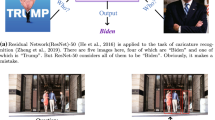Abstract
Most existing cognitive architectures integrate computer vision and symbolic reasoning. However, there is still a gap between low-level scene representations (signals) and abstract symbols. Manually attaching, i.e. grounding, the symbols on the physical context makes it impossible to expand system capabilities by learning new concepts. This paper presents a visual bootstrapping approach for the unsupervised symbol grounding. The method is based on a recursive clustering of a perceptual category domain controlled by goal acquisition from the visual environment. The novelty of the method consists in division of goals into the classes of parameter goal, invariant goal and context goal. The proposed system exhibits incremental learning in such a manner as to allow effective transferable representation of high-level concepts.
Preview
Unable to display preview. Download preview PDF.
Similar content being viewed by others
References
Billard, A., Dautenhahn, K.: Experiments in social robotics: grounding and use of communication in autonomous agents. Adaptive Behavior 7(3/4), 415–438 (2000)
Granlund, G.: A Cognitive Vision Architecture Integrating Neural Networks with Symbolic Processing. Kunstliche Intelligenz 2, 18–24 (2005)
Harnad, S.: Symbol Grounding and the Origin of Language. In: Computationalism: New Directions, pp. 143–158. MIT Press, Cambridge (2002)
Harnad, S.: Categorical Perception. Encyclopedia of Cognitive Science. Nature Publishing Group, Macmillan (2003)
Li, H., Olver, J., Sommer, G.: Computer Algebra and Geometric Algebra with Applications. In: Proceedings IWMM 2004 and GIAE 2004. LNCS, vol. 3519, pp. 258–277. Springer, Heidelberg (2005)
Fodor, J., Pylyshyn, Z.: Connectionism and cognitive architecture: A critique. Cognition 28, 3–71 (1988)
Gullapalli, V.: Reinforcement learning and its application to control. Ph.D. thesis, University of Massachusetts, Amherst, MA (1992)
Pauli, J., Sommer, G.: Perceptual organization with image formation compatibilities. Pattern Recognition Letters 23, 803–817 (2002)
Sloman, A., Chappel, J.: The altricial-precocial spectrum for robots. In: Proceedings IJCAI 2005 (2005)
Wermter, S., Sun, R.: Hybrid Neural Systems. Springer, Heidelberg (2000)
Author information
Authors and Affiliations
Editor information
Editors and Affiliations
Rights and permissions
Copyright information
© 2006 Springer-Verlag Berlin Heidelberg
About this paper
Cite this paper
Kittler, J., Shevchenko, M., Windridge, D. (2006). Visual Bootstrapping for Unsupervised Symbol Grounding. In: Blanc-Talon, J., Philips, W., Popescu, D., Scheunders, P. (eds) Advanced Concepts for Intelligent Vision Systems. ACIVS 2006. Lecture Notes in Computer Science, vol 4179. Springer, Berlin, Heidelberg. https://doi.org/10.1007/11864349_94
Download citation
DOI: https://doi.org/10.1007/11864349_94
Publisher Name: Springer, Berlin, Heidelberg
Print ISBN: 978-3-540-44630-9
Online ISBN: 978-3-540-44632-3
eBook Packages: Computer ScienceComputer Science (R0)




